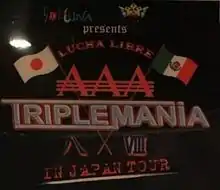Triplemanía VIII
Triplemanía VIII was the eighth Triplemanía professional wrestling show promoted by AAA. The show took place on July 5, 2000 in Tokyo, Japan. It was only the second show to take place outside Mexico and the first show to take place in Japan. The Main event featured an Eight-man "Atómicos" tag team match which saw AAA regulars team up with various Japanese wrestlers. The team of Octagón, Jushin Thunder Liger, Latin Lover, and El Alebrije took on Cibernético, Shiima Nobunaga, Abismo Negro, and Electroshock.
| Triplemanía VIII | |||
|---|---|---|---|
 The TV logo used when the show was broadcast on television with both the Mexican and the Japanese flag shown | |||
| Promotion | AAA | ||
| Date | July 5, 2000[1] | ||
| City | Tokyo, Japan[1] | ||
| Venue | Korakuen Hall[1] | ||
| Attendance | 1,700[1] | ||
| Pay-per-view chronology | |||
| |||
| Triplemanía chronology | |||
| |||
Production
Background
In early 1992 Antonio Peña was working as a booker and storyline writer for Consejo Mundial de Lucha Libre (CMLL), Mexico's largest and the world's oldest wrestling promotion, and was frustrated by CMLL's very conservative approach to lucha libre. He joined forced with a number of younger, very talented wrestlers who felt like CMLL was not giving them the recognition they deserved and decided to split from CMLL to create Asistencia Asesoría y Administración, later simply known as "AAA" or Triple A. After making a deal with the Televisa television network AAA held their first show in April 1992.[2] The following year Peña and AAA held their first Triplemanía event, building it into an annual event that would become AAA's Super Bowl event, similar to the WWE's WrestleMania being the biggest show of the year.[3] The 2000 Triplemanía was the eight year in a row AAA held a Triplemanía show and the fifteenth overall show under the Triplemanía banner.
Storylines
The Triplemanía VIII show featured six professional wrestling matches with different wrestlers involved in pre-existing scripted feuds, plots and storylines. Wrestlers were portrayed as either heels (referred to as rudos in Mexico, those that portray the "bad guys") or faces (técnicos in Mexico, the "good guy" characters) as they followed a series of tension-building events, which culminated in a wrestling match or series of matches.
Reception
John F. Molinaro from the Canoe.ca website wrote that the Triplemanía show that kicked off the tour was well received by the crowd.[4]
Aftermath
The rest of the AAA tour of Japan drew very low attendance figures, drawing only 409 in Nagoya and 507 in Kobe for the next two stops of the tour as AAA failed to gain the interest of the Japanese fans even by bringing in several well known Japanese wrestlers.[4] AAA had plans to do further tours in Japan in 2001 but after drawing such low interest they dropped the plans for regular tours.[4] AAA only made brief tours of Japan since then, teaming up with a Japanese promotion for the tours.[5]
Results
| No. | Results[1][6] | Stipulations | Times |
|---|---|---|---|
| 1 | Octagóncito defeated Mini Abismo Negro | Singles match | 04:38 |
| 2 | Gran Apache defeated Óscar Sevilla | Singles Match | 11:04 |
| 3 | El Oriental and Esther Moreno wrestled Pentagón and Xóchitl Hamada to a double count out | Tag team match | 12:14 |
| 4 | Perro Aguayo Jr., El Alebrije, and Pathfinder defeated Los Vatos Locos (El Picudo, Charly Manson and Espíritu), Team Japan (Naomichi Marufuji, Minoru Tanaka and Genki Horiguchi) and Los Vipers (Histeria, Psicosis and Maniaco)
|
Four corners elimination match | 12:33 |
| 5 | Heavy Metal and Tiger Mask IV defeated Kick Boxer and Yoshinobu Kanemaru | Tag Team match | 13:21 |
| 6 | Octagón, Jushin Thunder Liger, Latin Lover, and Hector Garza defeated Cibernético, Shiima Nobunaga, Abismo Negro, and Electroshock | Eight-man "Atómicos" tag team match[7] | 13:01 |
References
- "Asistencia Asesoría y Administración TripleManía". ProWrestlingHistory.com. Retrieved 2009-02-19.
- Ocampo, Ernesto (October 7, 2006). "El fin de una era". Súper Luchas (in Spanish). Retrieved October 14, 2009.
- Madigan, Dan (2007). "A family affair". Mondo Lucha Libre: the bizarre and honorable world of wild Mexican wrestling. HarperColins Publisher. pp. 128–132. ISBN 978-0-06-085583-3.
- Molinaro, John F. "2000 Year in Review - Mexico". Slam Wrestling!. Canoe.ca. Retrieved July 31, 2015.
- "Asistencia Asesoria y Administracion (AAA) Region: Asia". Cagematch. Retrieved August 1, 2015.
- "2000 Especial!". Box y Lucha Magazine (in Spanish). January 9, 2001. pp. 2–28. issue 2488.
- Ruiz, Alex G (May 29, 2009). "Los grandes ganadores de Triplemania". Súper Luchas (in Spanish). Retrieved July 11, 2015.